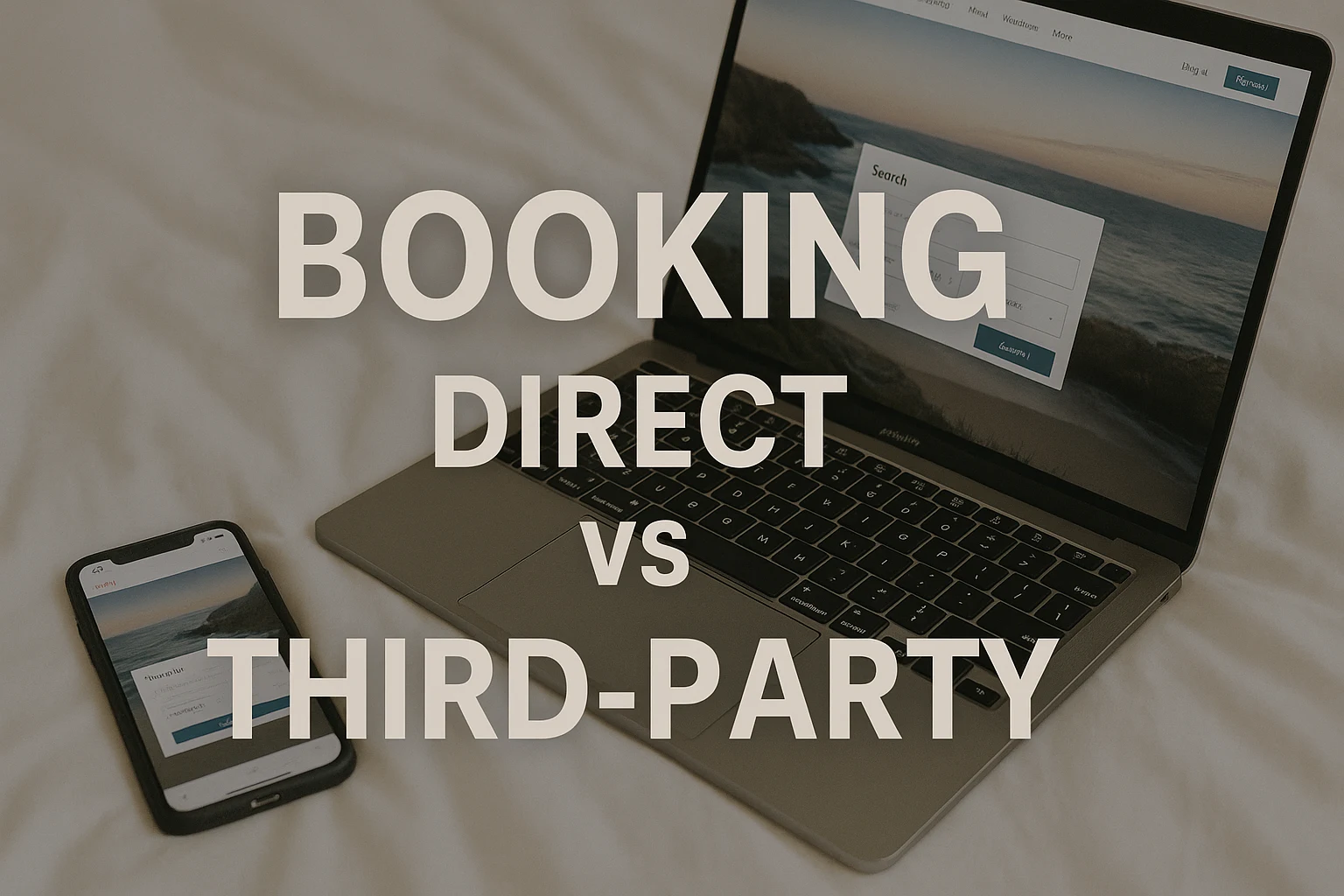In a world flooded with travel deals, one key question can save you hundreds on your next trip: Is it cheaper to book direct or use a third-party site?
You’ve seen the ads. Hotels push exclusive offers on their websites. Third-party platforms like Booking.com and Expedia showcase massive discounts and flash deals. But what’s the real difference—beyond the price tag?
This article breaks down the true costs, perks, and potential pitfalls of both booking methods so you can make smarter, more cost-effective travel decisions.
What Does Booking Direct Really Mean?
Booking direct means making your reservation through the company’s official channel—whether it’s a hotel, airline, or car rental service.
Examples of direct booking:
- Reserving a room on Marriott.com
- Booking a flight directly from Delta.com
- Renting a car through Hertz.com
Benefits of booking direct:
- Exclusive member rates and discounts
- Loyalty program points or elite status upgrades
- Free perks like Wi-Fi, breakfast, or late checkout
- Easier communication and customer support
- More flexible change and cancellation policies
Hotels and airlines often encourage direct booking because it saves them commission fees, so they’re motivated to offer you extra incentives.
What Are Third-Party Booking Platforms?
Third-party platforms, or Online Travel Agencies (OTAs), are websites and apps that aggregate travel deals across multiple providers. These include:
- Expedia
- Booking.com
- Priceline
- Kayak
- Agoda
- Trip.com
- Hotels.com
Why people use OTAs:
- Side-by-side price comparisons
- Convenience of bundling hotels, flights, and car rentals
- User reviews and ratings in one place
- Flash sales and mobile-only deals
- Promo codes and rewards programs
However, lower prices don’t always equal better value. OTAs may come with restrictions that aren’t obvious until it’s too late.
Price Comparison: Direct vs Third-Party
When Third-Party Might Be Cheaper:
- Bundled travel packages (e.g., flight + hotel deals)
- Flash sales or seasonal promotions
- Lesser-known accommodations or budget options
Hidden Costs to Watch For:
- Non-refundable booking policies
- Extra service fees or taxes not shown upfront
- Limited or no room for upgrades or perks
- Lack of access to loyalty programs
Example:
Hotel in New York City (3 nights)
- Direct (hotel website): $620 with free breakfast, late checkout
- Third-party site: $580 but no breakfast, early checkout, no points earned
Net savings when booking direct: ~$40 value plus loyalty benefits
Often, the price difference is minimal, but the value difference can be significant.
Perks and Loyalty Rewards
Booking direct often means access to exclusive perks. These might include:
- Earning or redeeming loyalty points
- Elite status upgrades
- Complimentary amenities (e.g., welcome drinks, better room views)
Most hotel and airline loyalty programs don’t recognize bookings made through third-party platforms. That means even frequent travelers can miss out on points and benefits if they book outside the provider’s ecosystem.
Customer Support and Flexibility
This is where the gap between direct and third-party booking becomes more noticeable—especially when things go wrong.
Booking Direct:
- Faster resolution from in-house staff
- Easier to modify, cancel, or get refunds
- More accountability
Booking Through a Third-Party:
- You’re often stuck between the hotel and the OTA
- Cancellations can involve long hold times or denied requests
- Refunds may take weeks or be denied altogether
If flexibility and direct communication matter to you, booking through the provider’s site is usually the safer option.
READ ALSO: How to Keep Kids Entertained on Long Travel Days
Real-Life Scenarios: Direct vs OTA
Scenario 1: Your flight is delayed and you arrive at your hotel at midnight.
- Direct booking: Room is held and front desk is informed
- Third-party: Room may be released as a no-show if the OTA failed to update the hotel
Scenario 2: You want to cancel your hotel stay due to a family emergency.
- Direct: Many hotels allow free changes or cancellations within a window
- OTA: “Non-refundable” often means exactly that—no wiggle room
Scenario 3: A price drops right after you book.
- Direct: Some providers match lower prices or refund the difference
- OTA: You may not qualify unless you pay extra for flexible rates
Smart Booking Hacks: Best of Both Worlds
Use OTAs to research, then book direct when it makes sense.
Tips:
- Use OTAs to compare prices, reviews, and options
- Once you find a good option, visit the provider’s site directly to check for added perks
- Call the hotel or airline and ask if they can match the OTA’s price
- Use browser extensions (like Honey or Skyscanner) to track and compare
- Sign up for loyalty programs even if you book only once a year—they often unlock hidden discounts
So, Which Saves More?
The short answer: It depends—but direct booking often wins on overall value.
While OTAs sometimes offer cheaper upfront pricing or bundles, the perks, flexibility, and loyalty points you get from booking direct can quickly outweigh the small savings.
When to book direct:
- For premium hotels, airlines, or chains with loyalty programs
- When flexibility or customer service is important
- If you want perks like free breakfast or upgrades
When to use third-party sites:
- For last-minute deals or bundled packages
- To compare prices quickly across many providers
- For budget or one-off stays where perks don’t matter
Final Thoughts
Don’t just ask “What’s cheaper?” Ask “What gives me the most value?”
Price, perks, support, and flexibility all factor into your total travel experience.
Next time you’re planning a trip, take an extra minute to compare direct vs third-party options—you might save more than just money.
In another related article, Rolling vs Folding: What Actually Saves the Most Space?







